John of Schoonhoven (Dutch Jan van Schoonhoven) (1356/7, Schoonhoven – January 22, 1432, Groenendaal) was a Flemish theologian and writer.

Dutch(Nederlands ) is a West Germanic language spoken by around 23 million people as a first language and 5 million people as a second language, constituting the majority of people in the Netherlands and Belgium. It is the third most widely spoken Germanic language, after its close relatives English and German.

Schoonhoven is a city and former municipality in the western Netherlands, in the province of South Holland. Since 2015 it has been a part of the municipality of Krimpenerwaard.

Flanders is the Dutch-speaking northern portion of Belgium and one of the communities, regions and language areas of Belgium. However, there are several overlapping definitions, including ones related to culture, language, politics and history, and sometimes involving neighbouring countries. The demonym associated with Flanders is Fleming, while the corresponding adjective is Flemish. The official capital of Flanders is Brussels, although the Brussels Capital Region has an independent regional government, and the government of Flanders only oversees the community aspects of Flanders life in Brussels such as (Flemish) culture and education.
After a philosophical education at the University of Paris he entered the convent of the regular canons at Groenendaal near Brussels (circa 1377), where he met John of Ruysbroeck. In 1386 he became prior and master to the novices. After the accession Groenendaal to the Windesheimer congregation he wrote many sermons, some of which became the most well-known writings at the general chapter. Beside these and other sermons, spiritual writings and letters, he wrote the then celebrated Epistola responsalis super epistolam cancellarii.

Philosophy is the study of general and fundamental questions about existence, knowledge, values, reason, mind, and language. Such questions are often posed as problems to be studied or resolved. The term was probably coined by Pythagoras. Philosophical methods include questioning, critical discussion, rational argument, and systematic presentation. Classic philosophical questions include: Is it possible to know anything and to prove it? What is most real? Philosophers also pose more practical and concrete questions such as: Is there a best way to live? Is it better to be just or unjust? Do humans have free will?

The University of Paris, metonymically known as the Sorbonne, was a university in Paris, France, active 1150–1793, and 1806–1970.

Brussels, officially the Brussels-Capital Region, is a region of Belgium comprising 19 municipalities, including the City of Brussels, which is the capital of Belgium. The Brussels-Capital Region is located in the central portion of the country and is a part of both the French Community of Belgium and the Flemish Community, but is separate from the Flemish Region and the Walloon Region. Brussels is the most densely populated and the richest region in Belgium in terms of GDP per capita. It covers 161 km2 (62 sq mi), a relatively small area compared to the two other regions, and has a population of 1.2 million. The metropolitan area of Brussels counts over 2.1 million people, which makes it the largest in Belgium. It is also part of a large conurbation extending towards Ghent, Antwerp, Leuven and Walloon Brabant, home to over 5 million people.
Schoonhoven was one of the responsible for defending Ruysbroeck against critics, especially Jean Gerson. His works, all written in Latin, reflect the influence of Ruysbroeck. However, his works focus more on practical ascese. He represents an important link in the evolution of spirituality from Ruysbroeck and Geert Groote until Desiderius Erasmus.
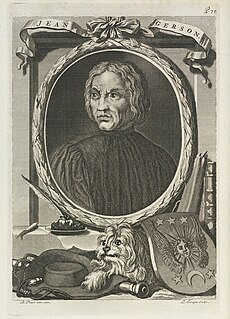
Jean Charlier de Gerson was a French scholar, educator, reformer, and poet, Chancellor of the University of Paris, a guiding light of the conciliar movement and one of the most prominent theologians at the Council of Constance. He was one of the first thinkers to develop what would later come to be called natural rights theory, and was also one of the first individuals to defend Joan of Arc and proclaim her supernatural vocation as authentic.

Gerard Groote, otherwise Gerrit or Gerhard Groet, in Latin Gerardus Magnus, was a Dutch Roman Catholic deacon, who was a popular preacher and the founder of the Brethren of the Common Life. He was a key figure in the Devotio Moderna movement.
Year 1432 (MCDXXXII) was a leap year starting on Tuesday of the Julian calendar.
Dietrich of Nieheim, medieval historian, was born at Nieheim, a small town subject to the see of Paderborn.
Giles of Rome O.S.A., was an archbishop of Bourges who was famed for his logician commentary on the Organon by Aristotle. Giles was styled Doctor Fundatissimus by Pope Benedict XIV. He was Prior General of the Augustinian order, and also authored two other important works, De Ecclesiastica Potestate, a major text of early 14th century papalism, and De Regimine Principum, a guide book for princes.

Antoinette Bourignon de la Porte was a French-Flemish mystic and adventurer. She taught that the end times would come soon and that the Last Judgment would then be felled. Her belief was that she was chosen by God to restore true Christianity on earth and became the central figure of a spiritual network that extended beyond the borders of the Dutch Republic, including Holstein and Scotland. Bourignon's sect belonged to the spiritualist movements that have been characterized as the "third power".
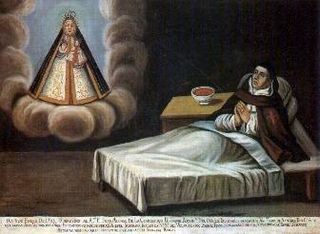
The Blessed John van Ruysbroeck was one of the Flemish mystics. Some of his main literary works include The Kingdom of the Divine Lovers, The Twelve Beguines, The Spiritual Espousals, A Mirror of Eternal Blessedness, The Little Book of Enlightenment, and The Sparkling Stone. Some of his letters also survive, as well as several short sayings. He wrote in the Dutch vernacular, the language of the common people of the Low Countries, rather than in Latin, the language of the Church liturgy and official texts, in order to reach a wider audience.
Hildebert was a French ecclesiastic, hagiographer and theologian. From 1096/7, he was bishop of Le Mans, then from 1125 until his death archbishop of Tours. Sometimes called Hildebert of Lavardin, his name may also be spelled Hydalbert, Gildebert, or Aldebert.

Angelo Maria Quirini or Querini was an Italian Cardinal of the Roman Catholic Church.
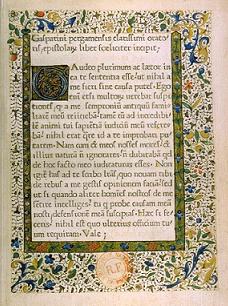
Johann Heynlin, variously spelled Heynlein, Henelyn, Henlin, Hélin, Hemlin, Hegelin, Steinlin; and translated as Jean à Lapide, Jean La Pierre , Johannes Lapideus, Johannes Lapidanus, Johannes de Lapide was a German-born scholar, humanist and theologian, who introduced the first printing press in France (Paris) in 1470.
Henry of Langenstein, also known as Henry of Hesse the Elder, was a German scholastic philosopher, theologian and mathematician.
Stephen Crisp (1628–1692) of Colchester, England, was a Quaker activist, "traveller in the Ministry" and prolific writer. He is credited with establishing the Quaker faith in the Low Countries (Holland). There was a Dutch expatriate community in Colchester and his mother and`second wife were Dutch. In 1683 he bought the ancient St Helen's Chapel and gave it to the Colchester Quakers.
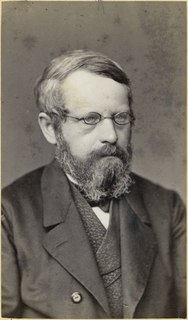
Otto Fridolinus Fritzsche also Otto Fridolin Fritzsche was a German Protestant theologian. He was born to a minister named Christian Friedrich Fritzsche (1776–1850).
Alpert of Metz was a Benedictine chronicler of the eleventh century. His De diversitate temporum is a major source for the history of Western Europe in the period it covers, which is 990 to 1021. It was dedicated to Burchard of Worms.

Jean de Roquetaillade was a French Franciscan alchemist.
John of Mirecourt, also known as Monachus Albus, was a Cistercian scholastic philosopher of the fourteenth century, from Mirecourt, Lorraine. He was a follower of William of Ockham; he was censured by Pope Clement VI.
Taius was a bishop of Zaragoza during the Visigothic period, from 651-664, succeeding his teacher Saint Braulius. His surname was Samuel (Samuhel).
Wilhelm Gnapheus was a Dutch-born Protestant religious figure and writer.
Henry of Nördlingen was a German Catholic priest from Bavaria, who lived in the 14th century, his date of death being unknown. He was the spiritual adviser of Margaretha Ebner, the mystic nun of Medingen.
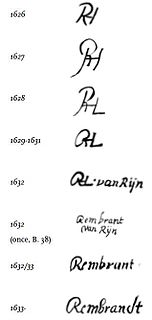
The Rembrandt Research Project (RRP) is an initiative of the Nederlandse Organisatie voor Wetenschappelijk Onderzoek (NWO), which is the Netherlands Organization for Scientific Research. Its purpose is to organize and categorize research on Rembrandt, with the aim of discovering new facts about this Dutch Golden Age painter and his studio. The project was started in 1968, but has since become the authority on Rembrandt and has final say in whether a painting is genuine.
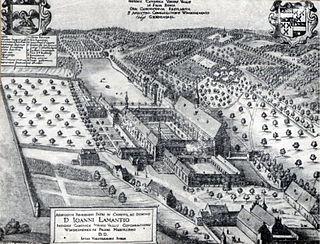
Groenendael Priory is located in the Forest of Soignes in the municipality of Hoeilaart in the Flemish Brabant, about 10 kilometres (6.2 mi) southeast of Brussels, Belgium.

















